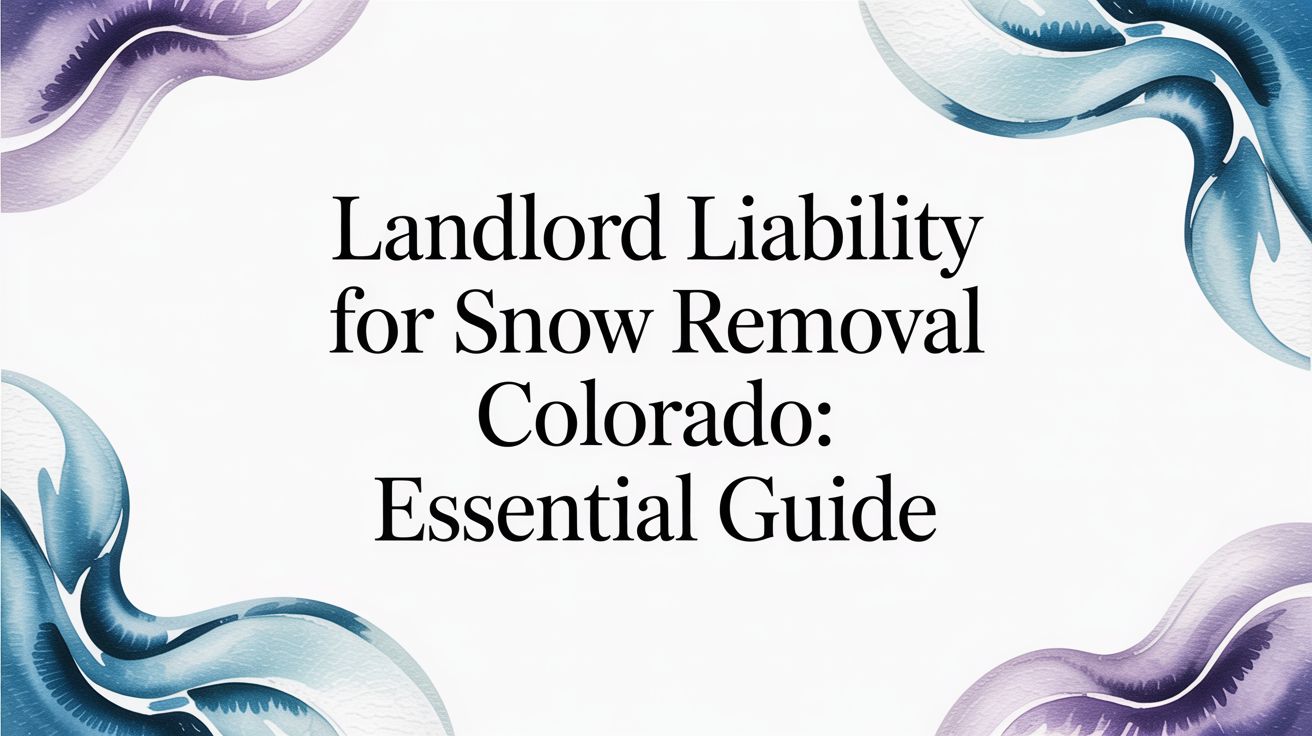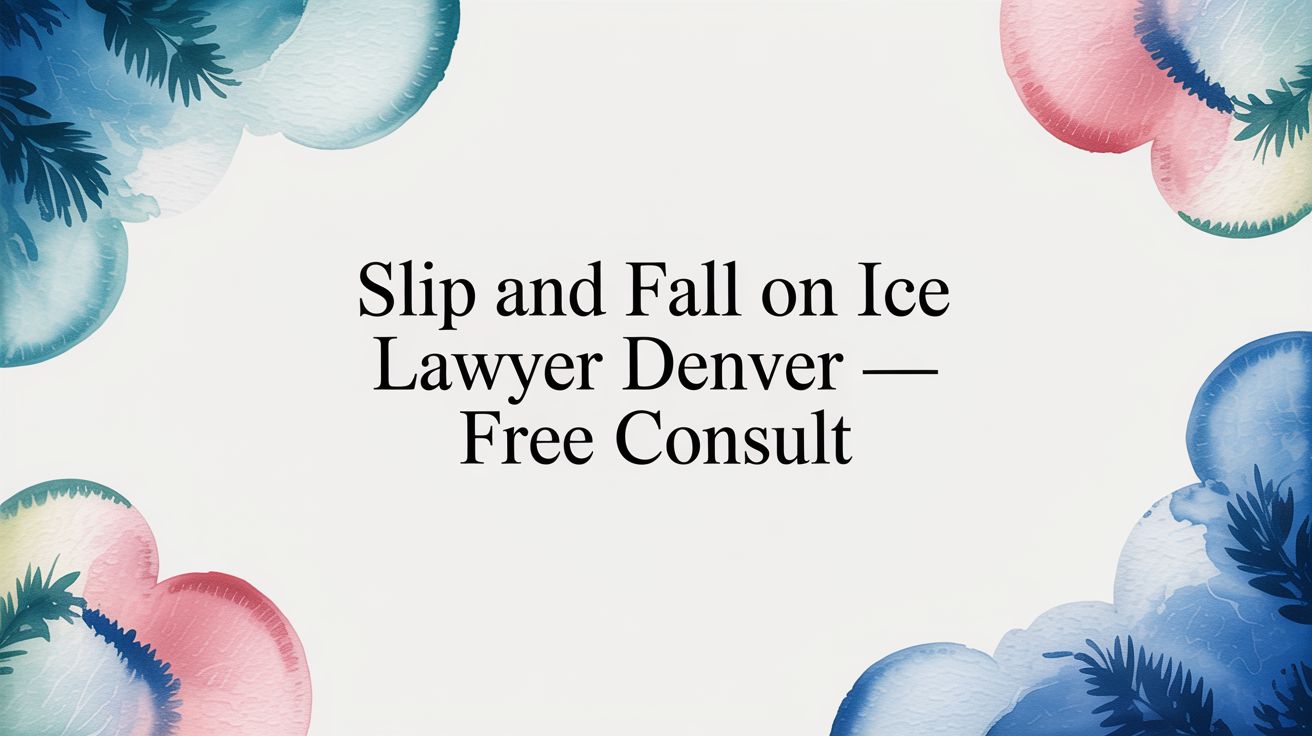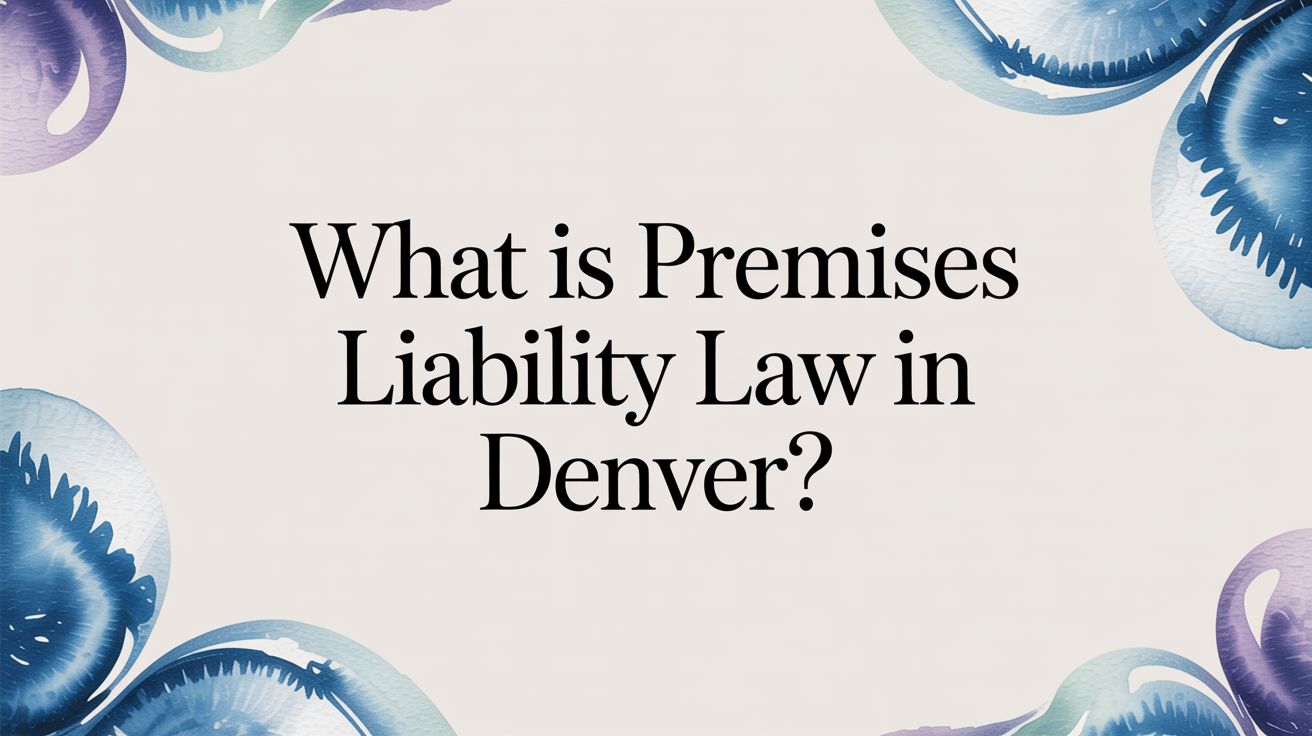Table of Contents
If you were injured in a slip and fall in Denver, one of your first questions is likely, "What is my case worth?" Understanding potential slip and fall settlement amounts in Colorado is crucial as you face medical bills and lost wages. While there is no single average, settlements can range from a few thousand to over a million dollars, depending entirely on the facts of your case.
This guide provides a clear overview of how these claims work for injured people in Denver, Aurora, Colorado Springs, and Fort Collins. It is for educational purposes and is not legal advice.
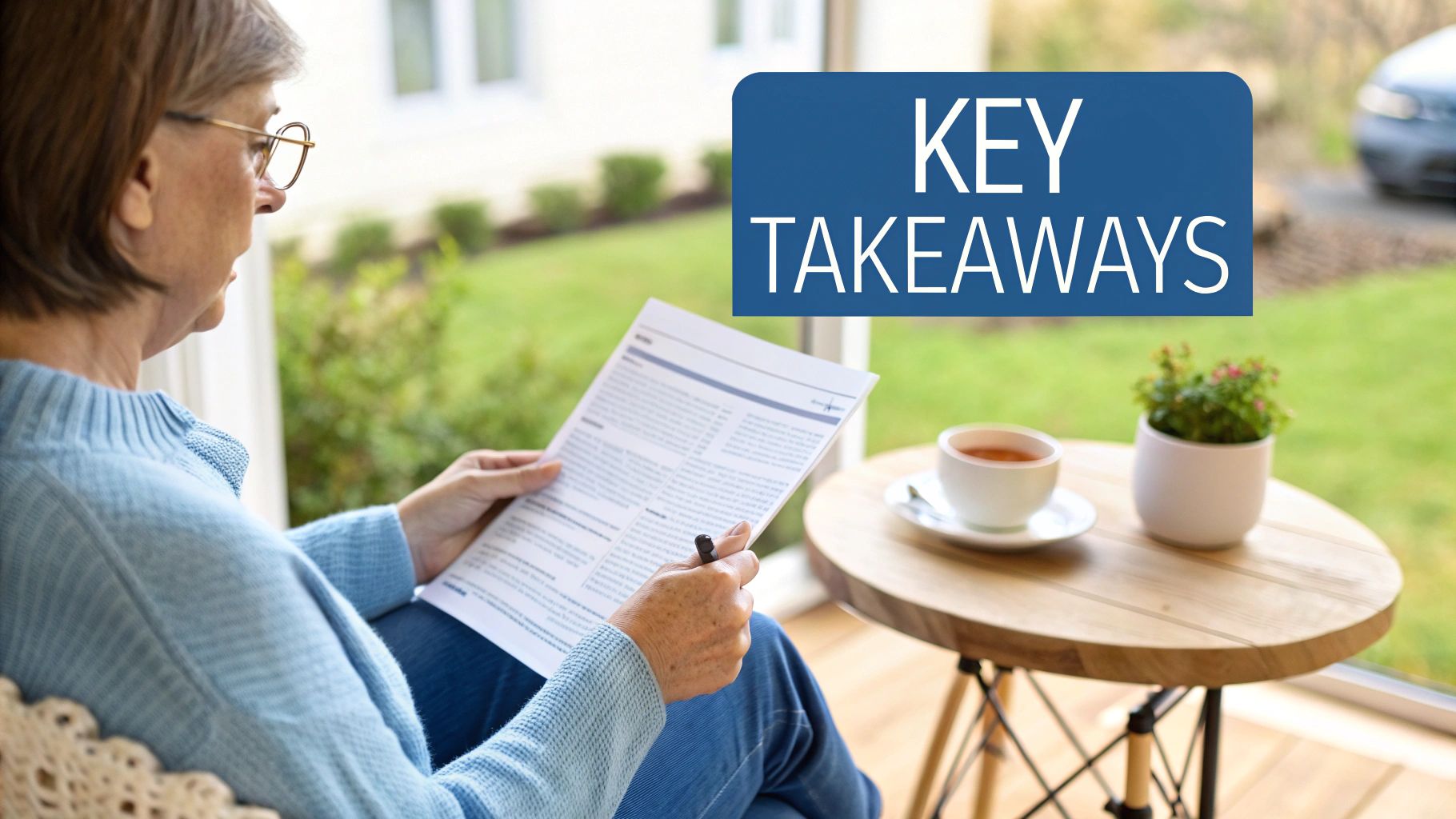
Key Takeaways
- Settlement Amounts Vary: There is no "average" slip and fall settlement in Colorado. The value of your claim depends on your unique injuries and losses.
- Injury Severity is the Biggest Factor: The more serious and permanent your injuries, the higher the potential compensation. This includes all past and future medical care and the impact on your quality of life.
- Evidence is Critical: To have a valid claim, you must prove the property owner was negligent. Strong evidence includes photos of the hazard, incident reports, witness statements, and complete medical records.
- Most Cases Settle: The majority of slip and fall claims are resolved through negotiations with an insurance company, not in a courtroom. However, preparing a case for trial is what pressures insurers to make a fair offer.
- An Attorney Protects Your Interests: Insurance companies aim to pay as little as possible. A personal injury lawyer builds your case, calculates the full value of your losses, and fights for the maximum compensation you deserve.
What Compensation Covers in a Slip and Fall Settlement
When we calculate a settlement demand, we are adding up every loss you have suffered because of the injury. This process involves identifying all your damages to show the full impact the fall has had on your life. Compensation is broken down into two main categories: economic and non-economic damages.
Economic Damages: Your Financial Losses
Economic damages are the measurable financial costs you incurred due to the accident. These are the losses that come with a receipt, bill, or pay stub. Keeping detailed records of these expenses is essential for building a strong case.
These costs often include:
- Medical Bills: Ambulance rides, emergency room visits, surgeries, hospital stays, and follow-up appointments.
- Future Medical Care: Ongoing physical therapy, rehabilitation, prescription medications, or necessary home modifications.
- Lost Wages: Income you lost while out of work recovering from your injuries.
- Loss of Earning Capacity: If your injuries prevent you from returning to your previous job or working at all, this covers the income you would have earned in the future.
Non-Economic Damages: The Human Cost
Non-economic damages compensate you for the physical and emotional toll the injury has taken. While these losses do not have a specific price tag, they are a critical part of any fair settlement. They acknowledge that an injury is more than just a stack of bills.
Common examples include:
- Pain and Suffering: Compensation for the physical pain and discomfort caused by your injuries.
- Emotional Distress: This includes anxiety, depression, fear, or insomnia that develops after a traumatic event.
- Loss of Enjoyment of Life: If your injuries stop you from participating in hobbies, sports, or family activities you once loved.
- Disfigurement and Scarring: Permanent scars or physical changes can impact a person’s self-esteem and quality of life.
Insurance companies use their own formulas to calculate these damages, which is why this is often the most disputed part of a claim.
Key Factors That Influence Your Settlement Value
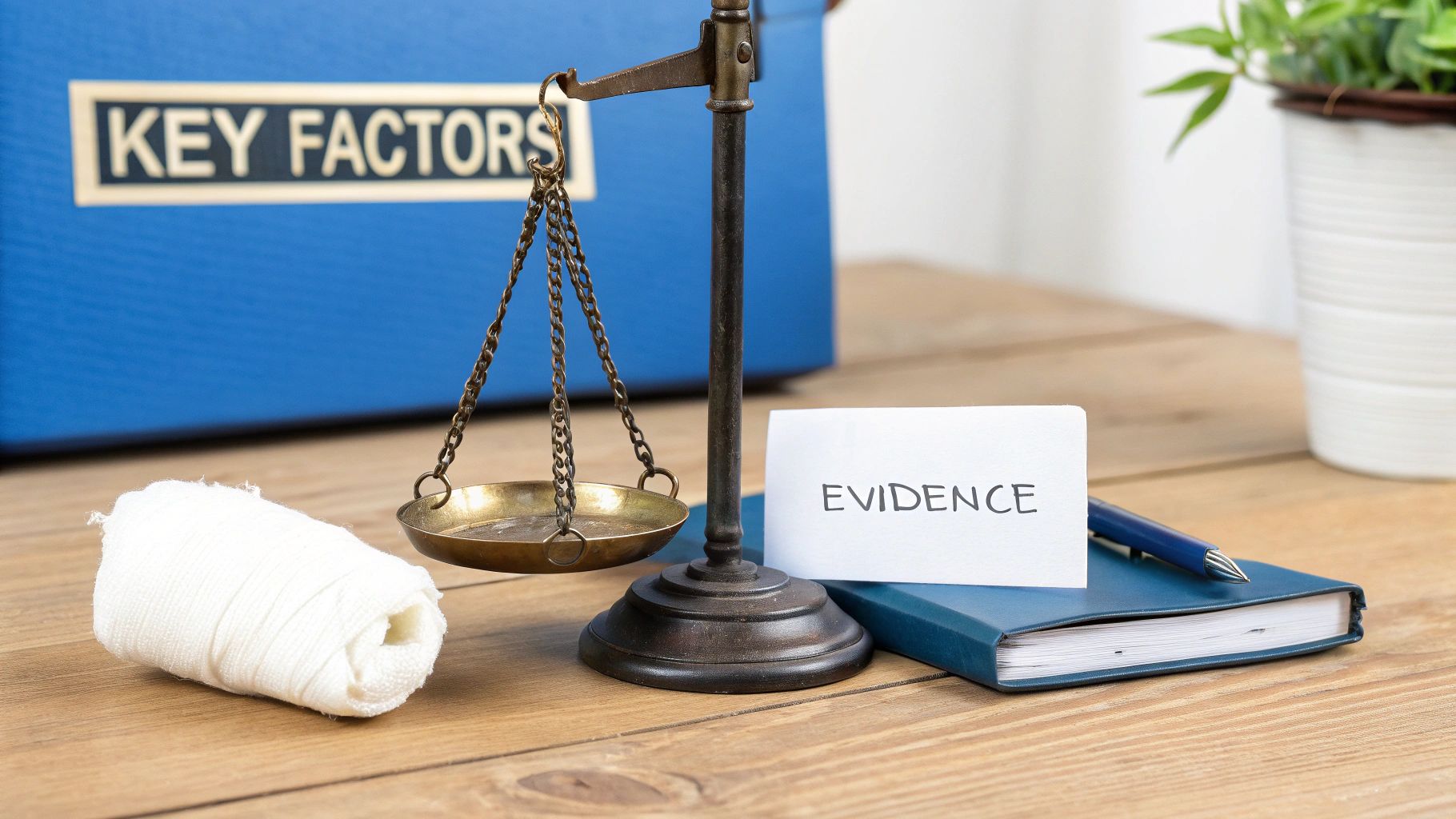
Several critical factors can significantly increase or decrease the final slip and fall settlement amount. An insurance company will analyze every detail to find reasons to reduce their payout. We build a powerful case backed by solid proof to counter their arguments.
The Severity of Your Injuries
The seriousness of your injuries is the most significant factor. A minor sprain that heals in a few weeks will result in a much lower settlement than a traumatic brain injury requiring a lifetime of care.
The value is tied directly to your medical needs.
- Past and Future Medical Treatment: Your settlement must cover all medical expenses, including any care your doctors anticipate you will need in the future.
- Permanent Impairment or Disability: If the fall leaves you with a permanent disability or chronic pain, the settlement value increases to account for that lifelong impact.
The Strength of Your Evidence
You must prove the property owner was negligent. If you cannot show they knew or should have known about a dangerous condition and failed to fix it, you do not have a case.
Strong evidence turns an incident into a valid legal claim. This includes:
- Photographs and Videos: Photos of the hazard that caused you to fall are powerful.
- Incident Reports: An official report filed with the business creates a formal record of the event.
- Witness Statements: Testimony from anyone who saw the fall can confirm the dangerous condition existed.
- Maintenance Records: These documents can sometimes show the property owner knew about a problem but failed to act.
Colorado’s Modified Comparative Negligence Rule
Colorado law plays a major role in personal injury settlements. The Modified Comparative Negligence rule (C.R.S. § 13-21-111) considers whether your own actions contributed to the accident.
If a jury decides you were partially at fault, your final compensation is reduced by your percentage of blame. For example, if your total damages are $100,000 but you are found 20% at fault, your award is reduced by $20,000, and you would receive $80,000.
However, if you are found to be 50% or more at fault, you cannot recover any compensation. Insurance adjusters often use this rule to shift blame and make low settlement offers. For the most serious cases, such as those involving catastrophic injuries, you should speak with a lawyer about your rights.
How the Process Works in Colorado
Navigating a slip and fall claim can feel overwhelming. Understanding the process can help you focus on your recovery. Here are the key stages of a claim in Colorado.
1. Initial Steps and Investigation
Your health is the top priority. Seek medical attention immediately after a fall. If you can, report the incident to the property owner, take photos of the hazard, and get contact information from any witnesses.
Once you hire an attorney, we begin a thorough investigation. We gather all medical records, request surveillance footage, interview witnesses, and may consult with medical or economic experts to build the strongest case possible.
2. The Demand and Negotiation Phase
After calculating your total damages, your lawyer sends a formal demand letter to the insurance company. This letter outlines your case and the settlement amount you are seeking. The insurer will review it and usually respond with a low counteroffer.
This begins the negotiation process. Your attorney handles all communication, pushing back against the insurer’s tactics to secure a fair settlement that covers your losses.
3. Filing a Lawsuit and Colorado Deadlines
If negotiations fail and the insurance company refuses to make a fair offer, the next step is to file a lawsuit. You must do this before Colorado’s statute of limitations expires. This is a strict legal deadline for filing a personal injury claim.
Timelines can vary, so it is crucial to speak with a lawyer to confirm the deadline for your specific case. If you miss it, you may lose your right to seek compensation forever.
Common Mistakes to Avoid
- Waiting to Seek Medical Care: Delays in treatment can make it harder to link your injuries to the fall.
- Giving a Recorded Statement: Do not give a recorded statement to the other party's insurance company without consulting an attorney first.
- Posting on Social Media: Insurance companies can use your posts to argue that your injuries are not as severe as you claim.
- Accepting the First Offer: The first offer is almost always too low and does not cover the full extent of your losses.
When to Call a Lawyer
You should consider calling a lawyer as soon as possible after a slip and fall accident, especially if:
- Your injuries are serious or require ongoing medical treatment.
- The property owner or their insurance company denies responsibility.
- The insurance company is pressuring you to accept a quick, low settlement.
- You are unsure of your rights or the value of your claim.
A free consultation allows you to understand your legal options without any obligation.
What to Bring to a Free Consultation
To make the most of your free consultation, try to gather any information you have related to the accident. This helps us provide a more accurate assessment of your case.
Bring any of the following that you have:
- The date, time, and location of the fall.
- The official incident report, if you have a copy.
- Photos or videos of the accident scene and your injuries.
- Names and contact information for any witnesses.
- Medical records, bills, and receipts related to your treatment.
- Information about any time missed from work.
- Any communication you have had with an insurance company.
Why Choose Conduit Law for Your Slip and Fall Case
Choosing the right legal partner is a critical decision. At Conduit Law, LLC, we combine legal expertise with genuine empathy for what our clients are going through. We know the tactics insurance companies use to minimize slip and fall settlement amounts, and we know how to fight back.
We build every case with careful attention to detail, from gathering evidence to consulting with experts. Our team handles all communications and negotiations so you can focus on your recovery. We fight for the maximum compensation our clients deserve.
We also work on a contingency fee basis. This means you pay no fees unless we win your case. This promise ensures everyone has access to skilled legal representation, regardless of their financial situation.
Frequently Asked Questions (FAQ)
How long do I have to file a slip and fall claim in Colorado?
Colorado has a statute of limitations that sets a strict deadline for filing a personal injury lawsuit. If you miss this deadline, you could lose your right to seek compensation. Timelines can vary depending on the details of your case, so it is critical to speak with an attorney to confirm the deadline that applies to you.
Can I still get a settlement if I was partially at fault?
Yes. Colorado follows a modified comparative negligence rule. This means you can still recover compensation as long as you are found to be less than 50% at fault for the accident. Your final settlement will be reduced by your percentage of fault.
Do I have to go to court to get a settlement?
It is highly unlikely. The vast majority of slip and fall cases are settled out of court through negotiations. We prepare every case for trial, which gives us leverage to secure a fair settlement without the stress of a courtroom battle. However, we are always prepared to go to court to protect your interests if a fair offer is not made.
If you have questions about your case, the team at Conduit Law is here to help. Call (720) 432-7032 or request a free consultation. There are no fees unless we win.
Written by
Conduit Law
Personal injury attorney at Conduit Law, dedicated to helping Colorado accident victims get the compensation they deserve.
Learn more about our team

